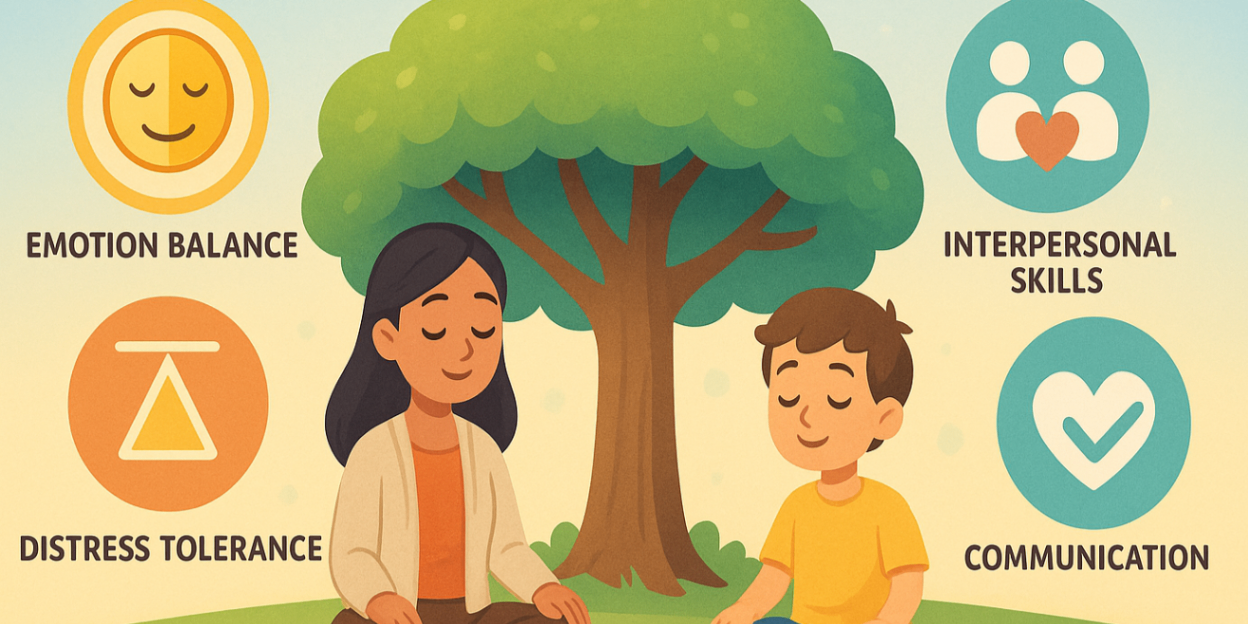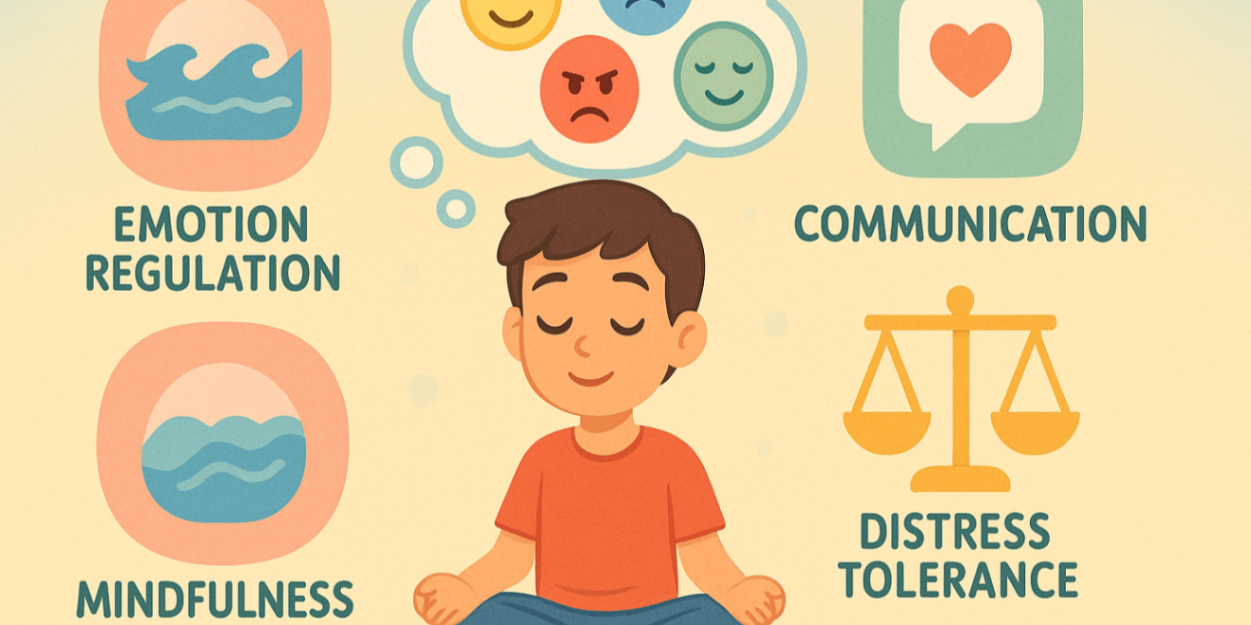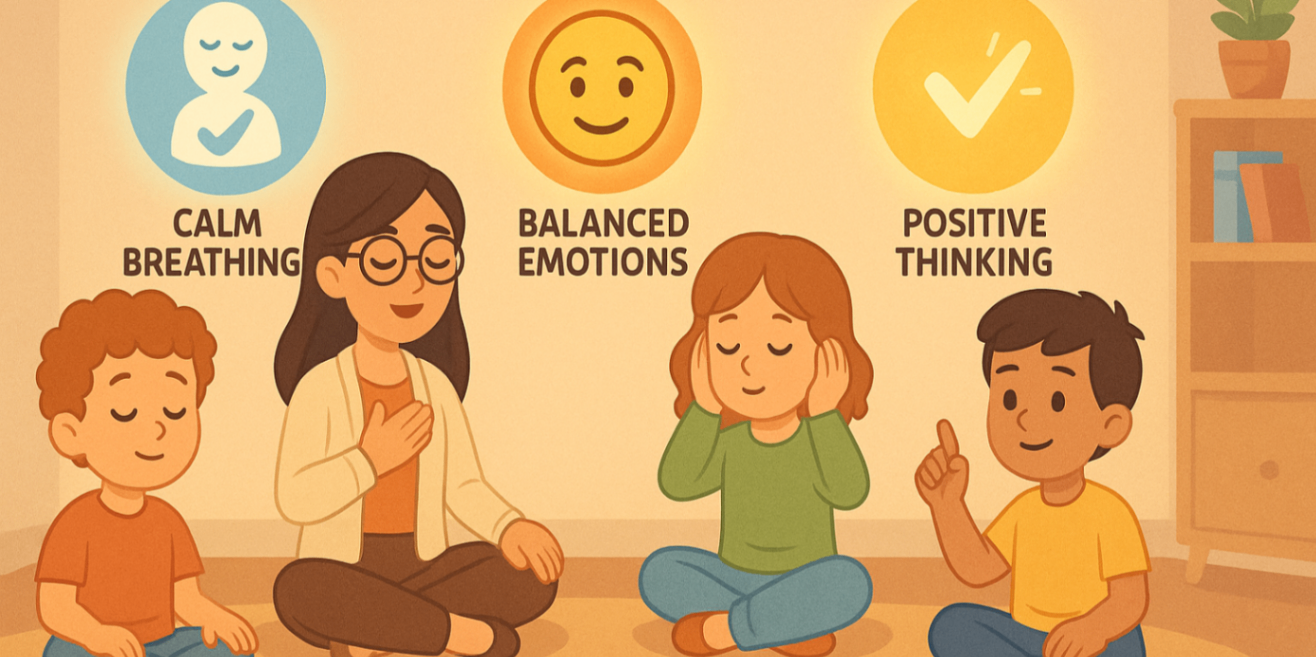
what is dialectical behaviour therapy? | what you need to know
10 October, 2025
Introduction
Have you ever felt overwhelmed by your emotions or struggled to manage your relationships? Dialectical Behaviour Therapy, or DBT, is a type of psychotherapy designed to help you take control of your thoughts, feelings, and interactions. It provides a structured path toward improving your mental health by teaching you practical skills. This approach to emotion regulation empowers you to navigate life's challenges more effectively, helping you build a life that feels more fulfilling and manageable.
Key Highlights
Here are the main takeaways about Dialectical Behaviour Therapy (DBT):
-
Dialectical Behaviour Therapy is a structured therapy focused on teaching you practical skills to build a better life.
-
It combines principles of acceptance and change to help you manage difficult emotions and situations.
-
Core skills training covers four areas: mindfulness, distress tolerance, emotion regulation, and interpersonal effectiveness.
-
DBT is an effective treatment for a range of mental health conditions, not just Borderline Personality Disorder.
-
The therapy uses a combination of individual sessions, group skills training, and coaching.
-
You will learn tangible emotion regulation skills and distress tolerance techniques to handle crises effectively.
Understanding Dialectical Behaviour Therapy (DBT)

Dialectical Behaviour Therapy is a form of Cognitive Behavioral Therapy (CBT) that helps people who experience emotions very intensely. While CBT focuses on changing unhelpful thought patterns, DBT adds other elements to give you a broader toolkit. This skills training approach helps treat various mental health conditions by building capabilities.
The core of DBT is learning four key DBT skills: mindfulness, distress tolerance, emotion regulation, and interpersonal effectiveness. By developing these abilities, you can better handle difficult situations and create a happier, more productive life. The following sections will explore its origins and core components.
Origins and Principles of DBT
The development of Dialectical Behaviour Therapy is credited to psychologist Marsha Linehan. She initially created this approach to more effectively treat individuals with chronic suicidal thoughts associated with borderline personality disorder, a group that traditional Cognitive Behavioral Therapy wasn't always successful with.
The therapy's name comes from the concept of "dialectics," which means integrating opposites. In DBT, the central dialectical behavior is the balance between acceptance and change. This means the therapy validates your current feelings and experiences (acceptance) while also helping you develop new skills and behaviors to create positive change.
This blend of validation and problem-solving is what makes the behavior therapy so unique. It acknowledges that your struggles are real and understandable, but it also provides the tools needed to improve your mental health and build a life you find truly worth living.
Key Components of the Therapeutic Approach
A comprehensive DBT program is structured and multifaceted, designed to provide robust support and effective skills training. The DBT therapy approach isn't just one thing; it's a combination of different modes of treatment working together toward a common goal. This structure ensures you are learning, practicing, and getting support throughout your journey.
The typical DBT program involves several key components that you participate in concurrently. This immersive structure helps reinforce the skills you learn and provides multiple avenues for support.
A standard DBT program generally includes:
-
Individual Therapy: Weekly one-on-one sessions with a therapist to address personal challenges and apply skills.
-
Group Therapy: Weekly group sessions that function like a class, focusing on learning the four skills training modules.
-
Phone Coaching: The ability to contact your therapist between sessions for in-the-moment guidance on using skills during a crisis.
How Does Dialectical Behaviour Therapy Work?

Dialectical Behaviour Therapy operates on the principle that many mental health challenges stem from a skills deficit. The DBT treatment plan aims to fix this by teaching you new, effective ways to cope. Instead of reacting to stress with unhelpful behaviors, you learn to manage triggers and reduce emotional intensity.
This is achieved through a combination of individual therapy and group sessions. The skills training focuses on building your emotional regulation skills, helping you become more aware of your responses and more tolerant of stress. Let's look closer at the role of dialectics and the different stages of therapy.
The Role of Dialectics in Treatment
At the heart of DBT is the concept of dialectics, which involves finding a synthesis between two opposites. The primary dialectical behavior in this therapy is balancing acceptance with the need for change. You learn to accept yourself and your life as they are in the present moment, while also working to make positive changes for the future.
A key skill related to this is radical acceptance. This doesn't mean you approve of a difficult situation, but rather that you acknowledge its reality without fighting against it. This acceptance reduces suffering and frees you up to focus on what you can control.
By embracing both acceptance and change, this behavioral therapy helps you move away from an "all-or-nothing" mindset. This balanced perspective is crucial for making lasting positive changes and navigating the complexities of your emotions and relationships without judgment.
Stages of DBT Therapy
A comprehensive DBT program typically progresses through distinct stages, each with a specific focus. This structured approach ensures that the most severe issues are addressed first, creating a foundation for further growth. The stages of DBT therapy guide both you and your therapist through the treatment process.
The journey starts with gaining control over life-threatening behaviors and progresses toward building a life that you genuinely enjoy. Each stage builds upon the last, moving from stabilization to addressing trauma and finally to resolving any remaining issues to achieve and sustain a high quality of life.
Your individual treatment plan and progress through the skills training group will follow this general framework.
|
Stage |
Focus of Treatment |
|---|---|
|
Stage 1 |
Gaining control over severe, life-threatening behaviors (e.g., self-harm) and therapy-interfering behaviors. The primary goal is stabilization. |
|
Stage 2 |
Addressing trauma and past experiences that contribute to emotional distress. This stage focuses on "quiet desperation" and helps you process painful emotions. |
|
Stage 3 |
Resolving everyday life problems, improving relationships, and learning to live with a sense of ordinary happiness and unhappiness. |
|
Stage 4 |
Finding deeper meaning, a sense of connectedness, and achieving a life of sustained joy and fulfillment. |
Core Skills Taught in Dialectical Behaviour Therapy

The foundation of DBT is built on four sets of powerful skills designed to give you practical tools for everyday life. These DBT skills are typically taught in group sessions, where you can learn and practice in a supportive environment. The goal is to build your competency in key areas that contribute to emotional well-being.
You will learn mindfulness techniques, distress tolerance strategies, emotion regulation methods, and interpersonal effectiveness skills. Each module provides a different set of tools to help you navigate your inner world and your relationships with others. Let’s explore each of these skills in more detail.
Mindfulness Techniques
Mindfulness is the foundational skill in DBT. These techniques teach you how to be more aware of your thoughts and emotions in the present moment without judging them. Mindfulness training helps you observe your internal experiences as they come and go, giving you the space to choose how you respond instead of reacting automatically.
Developing your mindfulness skills allows you to step back from intense emotions and see them for what they are—temporary states that do not define you. This awareness is the first step toward gaining control over your emotional life.
Some core mindfulness skills include:
-
Observing: Simply noticing your thoughts, feelings, and sensations without getting caught up in them.
-
Describing: Putting words to your experiences in a non-judgmental way.
-
Participating: Fully engaging in the current moment and activity without distraction.
-
Non-Judgmental Stance: Adopting an attitude of acceptance toward your thoughts and feelings.
Distress Tolerance Strategies
What do you do when you're in a crisis and can't immediately solve the problem? This is where distress tolerance skills come in. These DBT skills are designed to help you get through difficult situations without making them worse. The goal of distress tolerance is not to feel good, but to survive painful moments.
These strategies give you tangible ways to cope with intense emotional pain and urges. A central concept here is radical acceptance, which involves accepting reality for what it is. By learning to tolerate distress, you build confidence and resilience, knowing you can handle whatever life throws your way.
Examples of distress tolerance skills include:
-
Self-Soothing: Using your five senses to calm and comfort yourself (e.g., listening to soothing music, smelling a pleasant scent).
-
Improving the Moment: Using strategies like imagery, finding meaning, or prayer to make a stressful situation more tolerable.
-
TIPP Skills: Quickly changing your body chemistry to reduce extreme emotion by using Temperature, Intense exercise, Paced breathing, and Paired muscle relaxation.
Emotion Regulation Methods
If you often feel like your emotions are a rollercoaster you can't control, emotion regulation skills can help. This module teaches you how to manage and even change your emotional responses. Instead of being at the mercy of intense emotions, you learn how to identify them, understand their purpose, and reduce their intensity when needed.
These new skills for emotional regulation are not about suppressing feelings. They are about building a healthier relationship with your emotions. This can be particularly useful for anger management and reducing vulnerability to negative emotional states.
Key emotion regulation skills involve:
-
Checking the Facts: Determining if your emotional reaction fits the facts of the situation.
-
Opposite Action: Acting opposite to your emotional urge when the emotion is unjustified or unhelpful.
-
Problem Solving: Using systematic steps to solve the problems that are causing your painful emotions.
-
Building Positive Experiences: Proactively increasing positive events in your life to build emotional resilience.
Interpersonal Effectiveness Skills
Strong relationships are a key part of a life worth living, but they can also be a source of stress. Interpersonal effectiveness skills teach you how to manage your relationships in a way that maintains both your self-respect and the health of the relationship. This is a crucial component of an effective treatment plan.
These interpersonal skills help you communicate your needs clearly, set boundaries, and navigate conflict constructively. The goal is to be effective in your interactions so you can get what you want and need while treating others with respect.
The interpersonal effectiveness skills module covers:
-
Objective Effectiveness: Learning how to ask for what you want and say no effectively.
-
Relationship Effectiveness: Acting in ways that build and maintain positive relationships.
-
Self-Respect Effectiveness: Behaving in a way that keeps and increases your respect for yourself.
-
Validating Others: Communicating to others that their feelings, thoughts, and actions are understandable.
Conditions Commonly Treated with DBT
While originally developed to treat Borderline Personality Disorder (BPD), especially in cases involving suicide attempts, the use of DBT has expanded significantly. It's now recognized as an effective treatment for a wide range of mental health conditions where emotional dysregulation is a core issue.
Today, therapists use DBT to help people struggling with substance use, eating disorders, PTSD, depression, and even aggressive behavior. Its focus on skill-building makes it adaptable to many different personality disorders and challenges. Let’s examine its role in treating BPD and other conditions.
Borderline Personality Disorder and DBT
Dialectical Behaviour Therapy is widely considered the gold standard for treating Borderline Personality Disorder (BPD). It was specifically designed to address the core symptoms of BPD, such as intense mood swings, unstable relationships, impulsivity, and chronic suicidal thoughts.
The therapy directly targets the emotional dysregulation that is central to BPD. By teaching emotional regulation skills, DBT helps individuals moderate their excessive emotions and better tolerate high levels of stress and other triggers that could lead to crises.
Numerous clinical trials have demonstrated DBT's effectiveness in reducing suicidal behavior, self-harm, and treatment dropout rates for individuals with BPD. It provides a structured, supportive framework that empowers people to manage their symptoms and build a life they feel is meaningful and worth living.
Application to Other Mental Health Conditions
The principles and skills of DBT have proven beneficial for a variety of other mental health conditions beyond BPD. The therapy's focus on managing emotions and tolerating distress is applicable to many challenges, significantly improving quality of life for a broad range of people in public mental health systems and private practice.
Whether it's helping someone reduce cravings in substance abuse or manage impulsivity with Attention Deficit Hyperactivity Disorder (ADHD), the skills taught in DBT provide a practical foundation for behavioral change.
DBT has been successfully adapted to treat:
-
Substance Abuse: Helps manage cravings and avoid high-risk situations.
-
Eating Disorders: Improves distress tolerance and emotion regulation to combat urges related to binging and purging.
-
Post-Traumatic Stress Disorder (PTSD): Provides grounding techniques to manage symptoms and process traumatic events.
-
Anxiety & Depression: Helps you become aware of and change negative thought patterns.
Conclusion
Dialectical Behaviour Therapy (DBT) offers a unique and effective approach to mental health treatment, emphasizing the balance of acceptance and change. By integrating mindfulness, emotional regulation, and interpersonal effectiveness skills, DBT empowers individuals to manage their emotions and improve their relationships. Whether you’re dealing with borderline personality disorder or other mental health challenges, the principles of DBT can be transformative.
Help your child learn positive routines, manage emotions, and build lasting confidence through evidence-based behavioural therapy. Our therapists use proven techniques to guide every step of your child’s growth. Book your consultation now or call us at
02 9133 2500.
Frequently Asked Questions
How is DBT different from other types of therapy?
Dialectical Behaviour Therapy is a type of Cognitive Behavioral Therapy but with key differences. DBT places a greater emphasis on acceptance and validating emotions alongside pushing for change. It incorporates mindfulness and has a more structured format, focusing heavily on explicit skills training for emotional regulation and distress tolerance through group sessions.
Who can benefit from Dialectical Behaviour Therapy?
While created for Borderline Personality Disorder, many people can benefit from DBT. It is effective for those with various mental health conditions, including issues with substance use, eating disorders, PTSD, and depression. Individuals, including older adults, who struggle with intense emotions or managing relationships can find its skills highly valuable.
Are there resources or worksheets to support learning DBT skills?
Yes, DBT skills training heavily relies on practice and reinforcement outside of sessions. Therapists often provide an accompanying worksheet for each lesson, and clients typically use a diary card to track their emotions and skill use. These homework assignments are crucial for integrating DBT skills into daily life.
.svg)

















